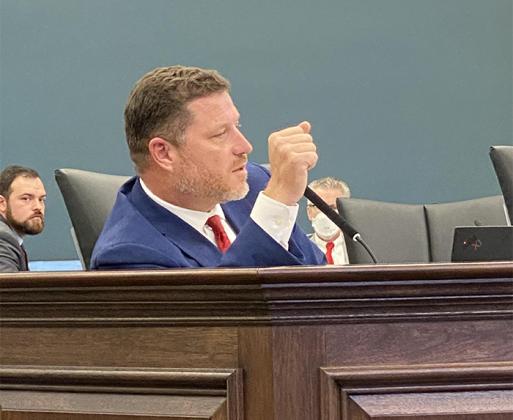By Jamie Wachter
jwachter@lakecityreporter.com
TALLAHASSEE — The sun may be setting on Floridians’ right to know.
The Florida Senate’s Rules Committee advanced HB 7049, a bill that would reduce transparency with public notice, on Tuesday afternoon by a 9-6 vote, sending it to the full Senate floor, where it is set to be heard today. The Senate session begins at 10 a.m.
The proposed legislation would allow local government agencies to place public notices of their actions on a government website instead of in local legal newspapers as well as on that newspaper’s free website and www.floridapublicnotices.com, a free and independent site operated by the Florida Press Association.
Public notices include meeting announcements or other actions, such as land use changes or tax increases.
Jeff Brandes, a St. Petersburg Republican, said during the committee hearing that he couldn’t believe his fellow Senators were considering supporting the bill, which has no Senate companion and was heard for the first time by any Senate committee on Tuesday — the 57th day of the 60-day session.
“This is essentially a solar eclipse on the public,” Brandes said. “It’s designed to block out the sunshine. That’s what this bill does; it blocks out the sunshine.
“It only hurts everyone. Nobody benefits from this thing. It’s a lose-lose. Why in the world would we support a lose-lose.”
Jason Brodeur, R-Lake Mary, who served as the bill presenter in the committee hearing, claimed the bill enhanced the compromised legislation reached last session, which expanded competition for public notices by allowing certain free newspapers to qualify, as well as allowing agencies to choose an online-only publication of their notices.
“The intent is to notice the most people,” Brodeur said.
However, Brandes questioned how the bill would accomplish that intent when all public notices in the state are already placed online at one centralized free-access state website rather than divided up among websites in every county, as well as being placed in some print newspapers. Brandes also raised concerns if local governments would face liability for public notices on their websites if the notices contained mistakes.
Brandes, as well as fellow Senators Gary Farmer Jr., D-Fort Lauderdale, Lauren Book, D-Plantation and Audrey Gibson, D-Jacksonville, were also concerned that the current law has only been in effect for 67 days.
“I don’t let my kids quit and I don’t think we should come in after only 67 days of this legislation and change it,” Book said, adding she felt the proposed legislation was “dangerous” in how it affects judicial proceedings notifications and was worried about the ability for public notices to be changed once they are already posted online without new notification.
Those concerns were echoed by several business lobbyists speaking against the bill and more than a dozen representatives from the Florida Press Association and its member newspapers, including Todd Wilson, publisher of the Lake City Reporter.
Wilson represented Community Newspapers Inc.’s Florida group including newspapers in Palatka, Callahan and Fernandina Beach, in addition to Lake City. He worked closely with legislators the past two sessions as a member of FPA’s Public Notice Task Force.
“We all worked in good faith with this Senate in a very successful partnership between the newspaper industry and government,” Wilson told the committee. “We had a deal with you guys. The law only went into effect 67 days ago. I’m asking you all to give it a chance to work.
“I ask you to stay with our current law from 2021, in effect only since Jan. 1 of this year. Please allow this new law to be charted and data evaluated for a few years, as we agreed to with Senate leadership.”
Jim Fogler, the president of the Florida Press Association, and Jake Seaton, the founder of Column, a technology company that moved to Florida to help the FPA revamp the statewide site, both said the current law is working as intended.
Brodeur even admitted that “there’s nothing wrong with the current law.”
But former Lt. Gov. Jeff Kottkamp, who is now a lobbyist, said there is a problem with the proposed legislation, saying it takes the state backwards from what was previously the best public notice law in the country. Kottkamp added the proposed bill creates digital discrimination against the elderly and minority populations, adding it wouldn’t actually save governments money either.
“If you really want to hide information, put it on a government website,” he said.
Farmer, who also took issue with the changes the bill calls for, mostly objected to the process that took place for the bill to be heard by the committee on Tuesday.
Normally, for legislation to be enacted, bills are filed in both chambers of the Legislature and advance through multiple committee hearings throughout the session before going before the respective full bodies.
Instead, HB 7049 was considered and heard for the first time Tuesday. By assigning it to the Rules Committee, which called the meeting Monday to consider the bill, it also allowed a rule that requires a 2/3 vote to consider a House bill on the Senate floor.
“This is an end around on that time-honored rule to prohibit this kind of last-second, ill-prepared consideration by one committee,” Farmer said.

